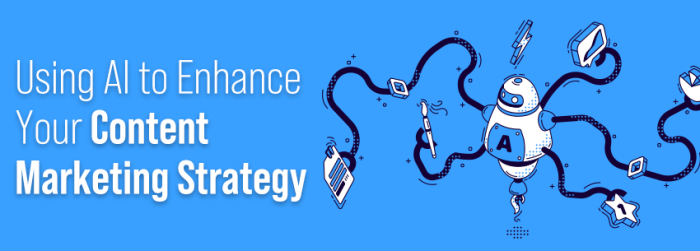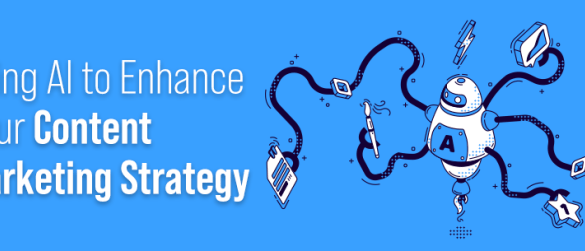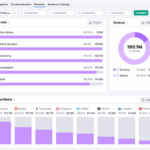The ultimate guide to AI for content marketing strategy dives deep into the transformative power of artificial intelligence in shaping compelling content strategies. We’ll explore how AI tools are revolutionizing content creation, optimization, and overall marketing performance, from initial ideation to final analysis.
This guide covers everything from understanding different AI tools to crafting AI-driven content strategies and measuring their effectiveness. We’ll dissect the benefits and drawbacks of using AI, and showcase real-world examples of its successful application in content marketing.
Introduction to AI in Content Marketing
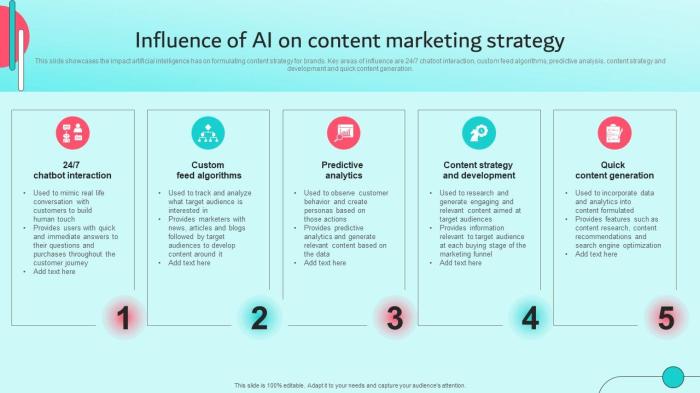
Artificial intelligence (AI) is rapidly reshaping the landscape of content marketing, empowering businesses to create more engaging, personalized, and data-driven content strategies. AI tools are automating tasks, analyzing vast amounts of data, and predicting consumer behavior, ultimately leading to higher conversion rates and improved ROI. This transformation is impacting every stage of the content lifecycle, from ideation and creation to distribution and analysis.AI’s impact on content marketing goes beyond simple automation.
It’s about leveraging intelligent systems to understand audience needs and preferences, enabling businesses to craft content that resonates deeply and drives meaningful interactions. This shift demands a proactive approach from marketers, requiring a nuanced understanding of how AI tools work and how to integrate them effectively into existing workflows.
AI’s Transformation of Content Marketing
AI is fundamentally changing how content is created, distributed, and analyzed. Instead of relying solely on human intuition, marketers can leverage AI’s ability to process massive datasets, identify trends, and predict future performance. This allows for more strategic and targeted content campaigns, resulting in greater efficiency and effectiveness.
Key Benefits of AI in Content Strategy
AI-powered tools offer several compelling advantages for content marketers. These benefits include increased efficiency, improved personalization, and enhanced insights into audience behavior. The ability to automate repetitive tasks, such as content scheduling and social media posting, frees up human resources to focus on more strategic initiatives.
- Increased Efficiency: AI streamlines content creation and distribution processes. By automating tasks like research, content optimization, and social media scheduling, AI frees up marketers to focus on higher-level strategy and creativity. For example, AI tools can analyze competitors’ content and identify gaps in the market, enabling businesses to develop unique and compelling content.
- Enhanced Personalization: AI enables businesses to tailor content to individual customer preferences. By analyzing user data, AI can recommend relevant content, products, or services, leading to higher engagement and conversion rates. This is crucial for building lasting customer relationships. For example, AI-powered email marketing platforms can personalize subject lines and content based on individual user behavior.
- Data-Driven Insights: AI tools provide valuable insights into audience behavior and preferences. By analyzing website traffic, social media engagement, and other metrics, AI can identify patterns and trends, helping marketers understand what content resonates most with their target audience. This understanding is essential for optimizing content strategies and achieving better results.
Types of AI Tools in Content Creation
A diverse range of AI tools and technologies support various stages of the content creation process. These tools encompass everything from content generation to analysis and optimization.
- Natural Language Processing (NLP) Tools: NLP tools are crucial for tasks such as content generation, summarization, translation, and sentiment analysis. These tools can analyze vast amounts of text data, identify key themes, and generate content that aligns with specific s or topics. For instance, NLP can generate various article formats, from short blog posts to in-depth research papers, tailored to the target audience.
- Machine Learning (ML) Tools: ML algorithms are used to analyze user data and predict future behavior. This enables marketers to personalize content and optimize their campaigns for maximum impact. For example, ML can identify patterns in customer preferences, allowing for the development of targeted advertising campaigns and personalized recommendations.
- Content Optimization Tools: These tools assist in optimizing content for search engines () and user engagement. They identify relevant s, suggest improvements in content structure, and evaluate readability, ultimately boosting the performance of content across various platforms.
Traditional vs. AI-Powered Content Creation
| Feature | Traditional Content Creation | AI-Powered Content Creation |
|---|---|---|
| Content Creation Speed | Slower, often requiring multiple steps and manual effort. | Faster, automated processes generate content quickly. |
| Content Personalization | Limited personalization based on basic segmentation. | Highly personalized content tailored to individual user profiles. |
| Data Analysis | Limited data analysis; relies on intuition and experience. | Leverages vast datasets to provide insights into audience behavior and trends. |
| Cost | Potentially higher due to manual labor and resource allocation. | Potentially lower due to automation and optimized resource utilization. |
| Scalability | Limited scalability; challenging to adapt to large-scale campaigns. | High scalability; easily adaptable to large-scale campaigns. |
Understanding AI Content Creation Tools
AI tools are rapidly transforming content marketing, automating tasks and enhancing output quality. This section delves into the diverse world of AI content creation tools, exploring their functionalities, strengths, weaknesses, and how they optimize content. Understanding these tools empowers marketers to leverage AI’s potential effectively.AI content creation tools are no longer a futuristic concept but a tangible asset in today’s marketing landscape.
They range from basic content generators to sophisticated platforms offering comprehensive content optimization capabilities. This empowers marketers to streamline their workflow, create high-quality content at scale, and ultimately achieve better engagement and results.
AI Tools for Content Generation
AI tools excel at generating various content formats, including blog posts, articles, social media updates, product descriptions, and more. These tools leverage natural language processing (NLP) and machine learning (ML) algorithms to produce human-quality text. This accelerates the content creation process and allows marketers to focus on strategic tasks.
Comparison of AI Content Creation Platforms
Different AI platforms cater to diverse needs and budgets. Some platforms focus on specific niches, like technical writing or creative copy, while others provide a broader range of functionalities. Consider factors like pricing models, output quality, and customization options when evaluating different tools. Evaluating the pros and cons of each tool allows marketers to select the best fit for their unique requirements.
AI Tools for Content Optimization
Beyond generation, AI tools play a crucial role in optimizing content for search engines and user engagement. AI-powered tools analyze content for readability, s, and engagement metrics. This allows marketers to refine their content to maximize its impact. Utilizing these tools is essential for ensuring that content is discoverable and engaging.
Popular AI Content Creation Tools
- Jasper.ai: A comprehensive platform offering various tools for content creation, including blog posts, social media content, and more. Jasper boasts a large language model that allows for creative and informative content. It integrates with various marketing tools and allows for user-defined templates and formatting.
- Copy.ai: Known for its efficiency in generating diverse types of content, including ad copy, product descriptions, and marketing materials. Copy.ai’s strength lies in its ability to create persuasive and engaging content tailored to different marketing objectives. It’s particularly useful for quickly generating various marketing materials.
- Rytr: This platform focuses on generating high-quality content, with a focus on optimization. Rytr provides various templates and prompts to streamline the writing process, aiding in the creation of content aligned with specific needs and strategies. Its pricing model is often appealing for smaller businesses and solo marketers.
- Writesonic: Writesonic stands out for its user-friendly interface and diverse content creation capabilities. It offers a wide range of content formats, from articles and blog posts to social media captions. Its ease of use makes it accessible to marketers with varying levels of technical expertise.
AI-Driven Content Strategy Development
AI is rapidly transforming content marketing, moving beyond simple automation to strategic planning. By integrating AI tools into your existing content strategy, you can create more targeted, engaging, and effective campaigns. This involves understanding how AI can analyze data, identify trends, and ultimately, help you connect with your ideal audience in a more meaningful way. This section delves into the practical application of AI in content strategy development.
So, you’re diving into the ultimate guide to AI for content marketing strategy? Excellent! Knowing how to optimize your Google Ads campaigns is crucial, and understanding metrics like ad strength – specifically, an average excellent ad strength in Google Ads – can significantly boost your results. This detailed guide covers everything from utilizing AI tools for content creation to crafting targeted ad copy that aligns with the best practices found in resources like ad strength google ads average excellent.
Ultimately, the guide will equip you to leverage AI to supercharge your content marketing strategy for maximum impact.
Integrating AI into Existing Content Marketing Strategy
AI tools can be seamlessly integrated into existing content marketing workflows. Instead of starting from scratch, you can leverage AI to enhance existing processes. This might involve using AI tools to analyze existing content performance data, identify areas for improvement, and suggest content optimization strategies. This iterative approach allows for a gradual and effective transition to an AI-driven content strategy.
Identifying Target Audiences and Tailoring Content
AI excels at identifying and segmenting target audiences based on demographics, interests, and online behavior. AI-powered tools can analyze vast amounts of data to create detailed audience profiles, revealing insights into their needs, preferences, and pain points. This allows for the creation of highly targeted content tailored to specific audience segments, leading to improved engagement and conversions. For example, a fashion brand could use AI to identify demographics interested in sustainable fashion, creating content specifically for that segment.
Generating Engaging and Informative Content Formats
AI can be instrumental in generating engaging and informative content formats beyond simple text. AI can assist in creating different content formats, such as videos, infographics, podcasts, and interactive content. This diversification caters to diverse audience preferences and enhances overall engagement. For example, AI can automatically generate scripts for video content or create interactive quizzes based on specific topics.
My ultimate guide to AI for content marketing strategy is all about leveraging the power of AI to supercharge your content creation. But to truly maximize your impact, understanding how to craft a compelling value proposition for your consulting firm is key. Check out these 5 steps to a better consulting firm value proposition to learn how to highlight your unique strengths and position yourself as a leader in your industry 5 steps to a better consulting firm value proposition.
Ultimately, this deeper understanding of value proposition will only strengthen your content marketing strategy, making it more targeted and effective, helping you attract the right clients.
AI-Powered Content Strategy Implementation Process
Flowchart for Implementing an AI-Powered Content Strategy
The process begins with defining specific content goals. These goals should be measurable and aligned with overall business objectives. Next, analyze audience insights using AI tools. This data will guide the development of an AI-driven content calendar, ensuring that content aligns with audience needs and interests. Implement and monitor the content, tracking key performance indicators (KPIs).
Regular evaluation and optimization are crucial to ensure the strategy remains effective and adaptable to evolving trends and audience preferences.
Content Creation and Optimization with AI
AI is revolutionizing content marketing by automating tasks and enhancing the quality of outputs. From generating diverse content types to optimizing existing material for search engines, AI empowers marketers to achieve better results with less effort. This section delves into practical methods for leveraging AI to create compelling and accurate content.AI tools are transforming content creation, from crafting blog posts and social media updates to generating website copy.
This capability allows marketers to produce more content in less time, freeing up resources for other crucial marketing activities. These tools analyze vast datasets, understand writing styles, and create original content that resonates with target audiences.
Generating Different Content Types
AI can generate a wide array of content formats, including blog posts, social media updates, and website copy. These tools leverage natural language processing (NLP) and machine learning algorithms to produce human-quality content tailored to specific topics and target audiences. By inputting s and desired tone, AI can produce diverse content variations, boosting content diversity and reach.
- Blog Posts: AI tools can generate Artikels, draft content, and even suggest topic ideas based on user input. This automation streamlines the content creation process, allowing marketers to focus on editing and refining the output for a polished final product. For example, an AI tool could create a blog post about “sustainable packaging” by incorporating s, style guides, and relevant data into the generated content.
- Social Media Updates: AI can craft engaging social media posts that are tailored to specific platforms and audiences. This involves understanding the nuances of different social media platforms, considering character limits, and incorporating relevant hashtags and calls to action. For instance, an AI could automatically generate a series of tweets about a new product launch, each tweet focusing on a unique aspect of the product and incorporating relevant hashtags to maximize visibility.
- Website Copy: AI tools can assist in crafting compelling website copy for product descriptions, landing pages, and other website sections. This can involve analyzing competitor copy, identifying key selling points, and creating persuasive language to engage visitors and encourage conversions. For instance, an AI could generate a detailed product description that highlights key features, benefits, and competitive advantages, increasing the likelihood of customer interest.
Optimizing Existing Content
AI can enhance existing content by improving its search engine optimization () performance. AI-powered tools can analyze content, identify areas for improvement, and suggest modifications to increase visibility and engagement. This process involves evaluating existing content, understanding its strengths and weaknesses, and recommending changes that align with search engine algorithms.
- Optimization: AI tools can identify relevant s and suggest their strategic integration into existing content. This involves analyzing search volume, competition, and user intent to ensure content aligns with user searches and improves ranking in search engine results pages (SERPs). This approach ensures that the content is highly visible to the target audience.
- Content Improvement Suggestions: AI can provide suggestions for improving readability, clarity, and engagement within existing content. This includes analyzing sentence structure, vocabulary, and overall tone to recommend improvements that enhance user experience. This optimization leads to a more user-friendly and engaging content experience.
Creating Compelling Marketing Copy
AI can assist in crafting compelling and persuasive marketing copy that resonates with target audiences. This includes analyzing audience preferences, identifying key selling points, and generating persuasive language that drives engagement and conversions. This strategy involves understanding the nuances of marketing language, identifying the unique value proposition of a product or service, and crafting messages that address the needs and desires of the target audience.
- Persuasive Language Generation: AI can analyze persuasive writing styles, identifying key elements of effective marketing copy. This analysis allows for the generation of copy that uses compelling language, calls to action, and emotional appeals to influence audience decisions. This creates marketing messages that resonate deeply with the audience.
- Personalized Messaging: AI can tailor marketing copy to individual user preferences, increasing the effectiveness of marketing campaigns. This personalized approach leverages data to create unique messaging that speaks directly to individual needs and desires. This strategy allows marketers to build stronger relationships with customers by offering personalized experiences.
Ensuring Content Accuracy and Consistency
AI tools can verify content accuracy and maintain consistency across various platforms. This process involves cross-referencing information against existing databases and ensuring consistent tone and style. By incorporating fact-checking and style guides, AI can ensure the reliability and uniformity of content.
- Fact-Checking: AI tools can cross-reference information with reliable sources to ensure accuracy and reliability. This process identifies potential inaccuracies and provides corrections, ensuring content accuracy. This accuracy is crucial for building trust with the target audience.
- Maintaining Style Consistency: AI can enforce consistent tone and style across various content formats. This approach involves using predefined style guides and templates to maintain uniformity in writing style, voice, and tone. This consistency builds brand recognition and strengthens the overall brand image.
Measuring and Analyzing AI Content Performance
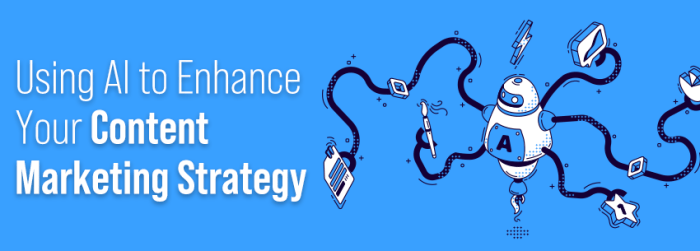
AI-powered content creation is rapidly evolving, but its effectiveness hinges on meticulous measurement and analysis. Simply churning out content isn’t enough; understanding how that content performs is crucial for optimizing future output and maximizing ROI. This section delves into the metrics and strategies for evaluating the success of AI-generated content, enabling you to refine your content strategy and achieve better results.AI tools generate a wealth of data, but this data is useless without the proper framework for interpretation.
This section focuses on actionable insights, transforming raw data into actionable strategies for improving content quality and audience engagement.
Key Performance Indicators (KPIs) for AI-Generated Content
Understanding which metrics to track is paramount to assessing the success of AI-generated content. A multifaceted approach is essential, considering both quantitative and qualitative factors.
- Engagement Metrics: These indicators measure audience interaction with the content. Examples include click-through rates (CTRs), time spent on page, social media shares, comments, and likes. High engagement signifies that the AI-generated content resonates with the target audience.
- Conversion Rates: This crucial metric reflects the effectiveness of the content in driving desired actions, such as sign-ups, purchases, or contact form submissions. Tracking conversion rates allows for assessment of the content’s impact on business goals.
- Performance: AI tools can enhance , but consistent monitoring is essential. Track rankings for targeted s, organic traffic, and backlinks to evaluate the content’s visibility and search engine optimization impact.
- Qualitative Feedback: While quantitative data is valuable, understanding audience sentiment and perception is equally important. Analyze comments, reviews, and feedback forms to gather insights into how users perceive the AI-generated content.
Analyzing Data Insights for Strategy Refinement
Data analysis is not a one-time exercise. Regular review and adaptation are vital to optimizing content performance. By identifying patterns and trends in the data, you can refine your content strategy and improve results.
- Identifying Trends: Analyze data over time to spot patterns in engagement, conversion rates, and performance. Understanding these trends provides insights into what content resonates best and when.
- A/B Testing: Use AI tools to create variations of content and test different approaches to determine which performs better. This iterative process allows for continuous improvement and optimized content.
- Audience Segmentation: Analyze data to segment your audience based on engagement patterns. This allows for the creation of content tailored to specific audience needs and interests, maximizing impact.
- Iterative Optimization: Regularly review data, identify areas for improvement, and refine the AI content generation process. This continuous feedback loop ensures consistent performance gains.
Key Metrics for Content Performance Analysis
The following table Artikels essential metrics for evaluating AI-generated content. Tracking these metrics provides a comprehensive view of content effectiveness.
| Metric | Description | How to Measure | Importance |
|---|---|---|---|
| Click-Through Rate (CTR) | Percentage of users who click on a link. | Divide clicks by impressions. | Indicates content relevance and attractiveness. |
| Time on Page | Average time users spend on a specific page. | Use website analytics tools. | Shows user engagement and content value. |
| Bounce Rate | Percentage of visitors who leave a page without interacting further. | Divide bounces by total visits. | Indicates content relevance and user experience. |
| Conversion Rate | Percentage of visitors who complete a desired action. | Divide conversions by total visitors. | Measures content effectiveness in achieving goals. |
| Social Shares | Number of times content is shared on social media. | Monitor social media platforms. | Reflects content virality and appeal. |
Case Studies of AI in Content Marketing
AI is rapidly transforming content marketing, and real-world case studies provide compelling evidence of its effectiveness. These examples demonstrate how AI can automate tasks, personalize experiences, and ultimately drive better results for businesses. Successful implementation isn’t just about deploying AI tools; it’s about integrating them into a strategic content plan that aligns with overall business objectives.AI is no longer a futuristic concept in content marketing; it’s a powerful tool for optimization and personalization.
So, you’re diving deep into the ultimate guide to AI for content marketing strategy? That’s awesome! But have you considered rag, the most important AI tool marketers have never heard of? rag the most important ai tool marketers have never heard of is a game-changer. Understanding tools like these will truly supercharge your content creation and strategy, which is key to succeeding in this ever-evolving digital landscape.
Learning about these tools is crucial for crafting an effective AI-powered content marketing plan, which is the heart of this guide.
Analyzing successful case studies allows us to identify key strategies, common challenges, and the measurable impact of AI-driven content strategies. These insights help businesses understand how to leverage AI for maximum return on investment (ROI) in their content marketing efforts.
Examples of AI-Driven Content Success
Several companies have successfully integrated AI into their content marketing strategies, achieving significant results. These case studies highlight the potential of AI to improve various aspects of the content creation process, from generating ideas to optimizing performance.
- E-commerce companies leveraging AI for product descriptions: Many e-commerce platforms utilize AI to generate compelling product descriptions automatically. This allows for faster listing times and ensures consistent quality across a vast catalog. For example, a company like “ApparelCo” may use AI to analyze product features, customer reviews, and competitor listings to create unique and engaging descriptions for each item, leading to increased click-through rates and conversions.
The impact is measurable in higher conversion rates and reduced time spent on product listings.
- News organizations using AI for content personalization: AI can tailor content recommendations to individual users based on their reading history and preferences. For example, a news publication like “The Daily Report” could use AI to curate personalized news feeds for each subscriber, ensuring they receive information relevant to their interests. This personalization can lead to increased engagement, loyalty, and ultimately, subscriber retention. The results are typically seen in higher user engagement and increased subscription rates.
- Marketing agencies employing AI for content strategy development: Agencies are utilizing AI to analyze market trends, competitor strategies, and audience data to develop comprehensive content strategies. For instance, an agency like “ContentCraft” might use AI to identify emerging s, predict future trends, and suggest optimal content formats, resulting in more targeted and effective campaigns. This proactive approach allows for more efficient resource allocation and a stronger return on investment for their clients.
Analysis of AI Content Performance Results
AI-powered content marketing tools provide valuable data insights that allow for better understanding of the impact on content performance. Analyzing these metrics allows businesses to assess the effectiveness of their AI implementation and refine their strategies.
- Improved performance: AI-generated content often incorporates relevant s and phrases, improving search engine rankings. This results in increased organic traffic and leads. For example, a blog post generated with AI tools might rank higher in search results for targeted s, driving more organic traffic and ultimately more conversions.
- Increased engagement metrics: AI-driven personalization can lead to higher engagement rates across various content formats. For example, a company like “TechSolutions” might use AI to personalize their blog posts, leading to higher click-through rates and comment engagement.
- Enhanced conversion rates: AI-powered content can significantly improve conversion rates by addressing user needs and providing relevant information. For instance, an online store might use AI to personalize product recommendations, ultimately driving more sales. The impact of such personalized recommendations can be substantial, leading to significant increases in sales figures.
Future Trends in AI for Content Marketing
The landscape of content marketing is rapidly evolving, and AI is poised to play an increasingly significant role. Understanding the emerging trends, challenges, and ethical considerations surrounding AI’s application is crucial for marketers to stay ahead of the curve. This section will delve into the future trajectory of AI in content marketing, examining potential shifts in strategy and the implications for the industry.The future of content marketing is inextricably linked to AI’s continued development.
AI tools are becoming more sophisticated, capable of generating creative content, optimizing existing material, and analyzing audience response with greater accuracy. This empowers marketers to create more personalized and engaging experiences, ultimately leading to better conversion rates and stronger brand loyalty.
Emerging Trends in AI Content Creation and Optimization, The ultimate guide to ai for content marketing strategy
AI is rapidly evolving from basic content generation to more nuanced tasks. Expect to see advancements in AI-powered tools that can analyze complex data sets, identify emerging trends, and predict future audience preferences. This ability will allow marketers to craft content that resonates with their target audience on a deeper level, leading to improved engagement and conversions. Furthermore, AI’s role in content optimization will expand beyond simple research.
Sophisticated algorithms will analyze user behavior across multiple platforms, tailoring content recommendations and delivery in real-time.
Potential Challenges and Opportunities for AI in Content Marketing
The adoption of AI in content marketing presents both challenges and opportunities. A key challenge is the need for marketers to adapt to new technologies and learn how to effectively leverage AI tools. Another potential challenge is the potential for bias in AI algorithms, which could lead to skewed content or inaccurate audience insights. Conversely, AI presents opportunities for increased efficiency and personalization.
Marketers can automate tasks, analyze vast amounts of data, and tailor content to individual user preferences, leading to higher engagement and conversion rates.
Ethical Considerations Surrounding AI Use in Content Marketing
Ethical considerations surrounding AI in content marketing are critical. Concerns about data privacy, algorithmic bias, and the potential for misuse of AI-generated content need careful consideration. Ensuring that AI tools are used responsibly and ethically is paramount to building trust with consumers and maintaining a positive brand image. Transparency about how AI is being used in content creation and optimization is essential.
Clear guidelines and ethical frameworks for the use of AI in content marketing are crucial.
How AI Might Evolve and Change Content Strategies in the Next 5 Years
In the next five years, AI will likely transform content strategies by enabling hyper-personalization. AI will analyze user data in unprecedented detail, allowing for the creation of highly customized content experiences. AI-powered chatbots and virtual assistants will become increasingly sophisticated, providing instant customer support and tailored recommendations. Moreover, AI will play a crucial role in optimizing content performance.
By analyzing user engagement metrics in real-time, AI will dynamically adjust content strategies, ensuring maximum impact. This real-time adaptation will be key to staying relevant and engaging in a fast-paced digital environment.
Concluding Remarks: The Ultimate Guide To Ai For Content Marketing Strategy
In conclusion, harnessing AI for content marketing is no longer a futuristic concept, but a practical necessity for staying competitive. This guide has equipped you with the knowledge to effectively integrate AI into your content strategy, unlocking new avenues for growth and innovation. By understanding the tools, strategies, and metrics involved, you’re well-positioned to navigate the evolving landscape of AI-powered content marketing.

